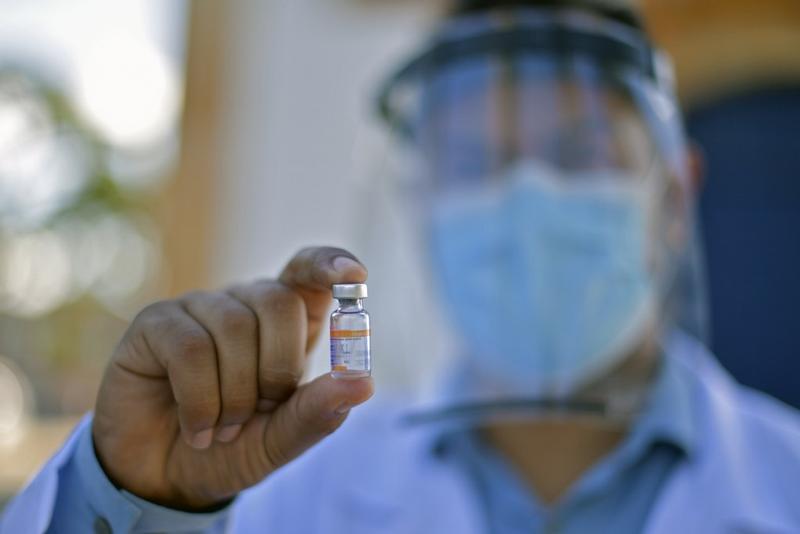 A doctor holds a vial of the Sinovac Biotech's CoronaVac against COVID-19 as inoculation started in front of the Santo Antonio church in Mateus Leme, Minas Gerais state, Brazil, on Jan 19, 2021. (DOUGLAS MAGNO / AFP)
A doctor holds a vial of the Sinovac Biotech's CoronaVac against COVID-19 as inoculation started in front of the Santo Antonio church in Mateus Leme, Minas Gerais state, Brazil, on Jan 19, 2021. (DOUGLAS MAGNO / AFP)
More Asian countries eager to jump-start their pandemic-ravaged economies are dosing up with Chinese-made COVID-19 vaccines, with senior officials gracing the stage for accelerating emergency mass inoculation programs.
Last week, Indonesian President Joko Widodo and the country’s deputy health minister, Dante Saksono, were inoculated with the Sinovac vaccine
Cambodia is planning to vaccinate 500,000 priority people. Prime Minister Hun Sen said that they “cannot wait any longer” and that China will donate one million doses of Sinovac COVID-19 vaccines, reversing his previous position that the nation would only use vaccines recognized by the WHO.
Thailand’s Ministry of Health said the country is eyeing to buy two million vaccines from Sinovac, with the first batch of 200,000 doses expected to arrive in the country next month. It is also anticipating some 26 million doses of vaccine using Oxford-AstraZeneca’s formula and technology, which will be produced in Thailand by Siam Bioscience later this year.
ALSO READ: A glimpse into Sinovac's COVID-19 vaccine work
Malaysian pharmaceutical group Pharmaniaga Bhd has struck a deal with China’s Sinovac to purchase 14 million doses of “ready-to-fill COVID-19 vaccines” and has been in talks with other vaccine makers to secure a total of 23.9 million doses of COVID-19 vaccines.
Chinese Foreign Minister Wang also promised Myanmar 300,000 doses of a Chinese vaccine and will give the nation a batch for free. China will continue to provide anti-epidemic materials according to Myanmar’s need. Myanmar has hit more than 130,000 cases and almost 3,000 deaths.
On Monday, the Drug Regulatory Authority of Pakistan (DRAP) has approved China-owned Sinopharm vaccines for emergency use. It is one of the two vaccines approved by the regulator.
The National Institute of Health said some 17,500 people have volunteered to take part in the trials underway at five different sites in Islamabad, Lahore and Karachi.
Pakistan is also in talks with a number of vaccine makers, according to a health official, and that the country could get “in the range of tens of millions” of vaccine doses under an agreement with China’s Cansino Biologics Inc.
The vaccine, referred to as Ad5-nCoV, is developed by China's CanSino Biologics and the Beijing Institute of Biotechnology. Shifa International Hospital in Islamabad is collaborating with the NIH on the Pakistani side.
Also on Monday, Azerbaijan’s senior health officials took their first dose of anti-coronavirus vaccines developed by Chinese biopharmaceutical company Sinovac Biotech, marking the beginning of mass vaccination against COVID-19 in the country, prioritizing healthcare workers and those in government.
Azerbaijan, which has logged 227,273 cases by Sunday, has secured 4 million doses of Sinovac vaccine.
Shahmar Movsumov, an assistant to the president of Azerbaijan, described the Chinese jab as "the most safe and effective vaccine" procured by Azerbaijan. Those who have received the COVID-19 shot will get a certificate.
Jordan has also approved China’s Sinopharm coronavirus vaccine for emergency use, after previously giving the Pfizer-BioNTech jab the green light. Jordan’s Secretary-General of the Health Ministry for Epidemiological Affairs Wael Hayajneh said 29 centers across Jordan are participating in the vaccination campaign.
Indonesia, which is hitting close to a million COVID-19 cases – the highest in Southeast Asia followed by the Philippines, has already begun its massive vaccination program for its 268 million population
Last week, Indonesian President Joko Widodo and the country’s deputy health minister, Dante Saksono, were inoculated with the Sinovac vaccine. Indonesia’s vaccine program is prioritizing healthcare workers as the main group, and targeting the young population.
In his recent visit to the Philippines, Chinese Foreign Mnister Wang Yi pledged that China would donate 500,000 doses of COVID-19 vaccines. Sinovac is seeking an emergency use authorization (EUA) for its CoronaVac vaccine from the Philippines’ Food and Drug Administration.
READ MORE: Turkey to begin Sinovac virus vaccinations before trials over
The archipelago had secured 25 million doses of Sinovac COVID-19 vaccines with the first 50,000 expected to arrive in February. The Philippines is also in talks with other vaccine makers and aims to inoculate up to 70 million people this year to achieve herd immunity.
Meanwhile, Uzbekistan started a phase-3 trial of COVID-19 vaccine for 5,000 volunteers developed by Chinese company Zhifei Longcom Biopharmaceutical in December.
Eight specialists from the Chinese firm, specialists from the Ministry of Innovative Development and the Research Institute of Virology of the Ministry of Health, have conducted vaccination trainings for Uzbek doctors and nurses.
Prime Sarmiento contributed to this story.


